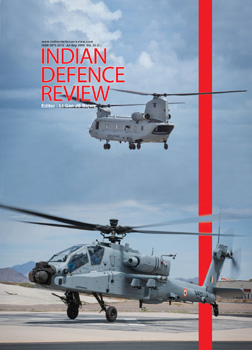While globalisation is being touted as one of the best thing to have happened to the world in recent past, the contrarian view may just be equally influential. An article in The Washington Post three years back said, “20 years ago, globalisation was pitched as a strategy that would raise all boats in poor and rich countries alike”.1 In purely economic terms, one may still argue for the positive fallouts of globalisation, but in terms of developmental differentials, exploitation of the weak and convergence of human values as also national interests, the recent records are not too bright, to say the least.
In the case of India, globalisation is being interpreted as “Vasudhaiva Kutumbakam” – the world is one family. In a family, it is important to treat everyone as an equal and help all to be happy and prosperous members. The spiritual vision encapsulates the essence of Indian spirituality that is Vedic in its core.2 The Indian interpretation of globalisation cannot be synonymous to globalisation, where national interests will always be the overriding factor. Globalisation can never adapt to the institution of a larger family concept, more so at the global level. Looking back at globalisation, the phenomena was propelled by development in science and technology that brought distances closer by providing means of communications, be it exchange and proliferation of ideas, transfer of goods & services, and human capital worldwide. Since the world consists of nation states of varying economic disparities and related security concerns, the idea of selling the dream of global connectivity seemed fascinating at that point.
However, as it emerged later, in the garb of globalisation and economic prosperity, the advantages and benefits got tilted heavily in favour of developed nations much more than the developing ones. The developing countries became the feeder to the rich nations with providing raw material exports to them at cheaper rates, and imports of finished products from them at much higher costs as a source of a new market economy. Though prosperity did come to some nations, then so did the new found freedom of expression and assertiveness. This gave rise to the feelings of nationalism on one hand due to exploitation differentials, and at the same time to socio-economic frictions within these nations. The result was enhanced social vulnerabilities of these nation-states, and at the same time, providing a tool of interference to their bigger partners. In this reference, China’s involvement in states like Sri Lanka, Bangladesh, Pakistan, Malaysia, Indonesia, Australia, and New Zealand, to name a few, is discernible. The newly appointed chief economic adviser to the International Monetary Fund, Gita Gopinath has spoken of anti-globalisation as one of the trends that are likely to emerge strongly in coming times.
A development at the United Nations General Assembly suggests that South Asia as a political construct, at least the one built from the top down, may just be finally collapsing. According to reports, three of the eight South Asian foreign ministers left the room after making their speeches at the annual gathering in New York. They were from Afghanistan, Bangladesh, and India, pointing towards the deepening crisis of credibility of the South Asian Association for Regional Cooperation as a South Asian regional forum.3 Economy and financial clout have emerged as strong tools of power politics in the international arena. This apparently has given rise to a new form of assertiveness with political economy and hard military power put together to form a new punch to diplomatic bargaining.
Economic issues see an enlarged scope that includes security aspects. This development holds great potential for the entry of bigger players to lure the smaller and less empowered member states with economic and security aid. This is precisely what raises the concerns of some nations which felt threatened for their autonomy at the cost of receiving financial loans and aid. China’s Belt and Road Initiative (BRI) is a case in point. The US Senate has passed a legislation on October 3 overhauling the way the federal government lends money for foreign development – a measure developed largely in response to China’s growing influence. American officials are worried that countries have been at risk of giving up their sovereignty when they fund infrastructure projects with Chinese loans that they cannot pay back.4
Finally, globalisation gave out its worst and most negative fallout following the 9/11 terrorist strikes on the US, and the global events that followed thereafter with the declaration of the Global War on Terrorism. As per a UN Refugee Agency (UNHCR) report, by the end of 2017, as many as 68.5 million individuals were forcibly displaced worldwide as a result of persecution, war, conflict, political violence and/or human rights violations. There is an increase of 2.9 million people over the previous year, and the world’s forcibly displaced population remains at a record high.5 The global war on terror and the follow-on conflicts brought with it showed what the nations couldn’t manage within their borders and were unable to foresee the problems under the surface.
A new security dimension is on the anvil with the accepting nations in terms of immigrants with a potential for generating socio-economic and security-related frictions in democratic nations. This could lead to the generation of an increased sense of sub-nationalism, and create situations and conditions that are ripe for asymmetric and sub-conventional warfare in many parts of the world. It is time for the democratic and free societies to keep a close tab on this developing security paradigm that is unveiling all over the world.
References
1 Jeffrey Rothfeder, “The Great Unraveling of Globalization” The Washington Post, April 24, 2015
2 Swami Agnivesh, “Why I have been assaulted” The Indian Express, August 18, 2018
3 C Raja Mohan, “Farewell to South Asia” The Indian Express, October 11, 2018
4 Patricia Zengerle, “Congress, eying China, votes to overhaul development finance” Reuters, October 4, 2018
5 UN Refugee Agency UNHCR, Forced Displacement in 2017, Annual Global Trends Study





